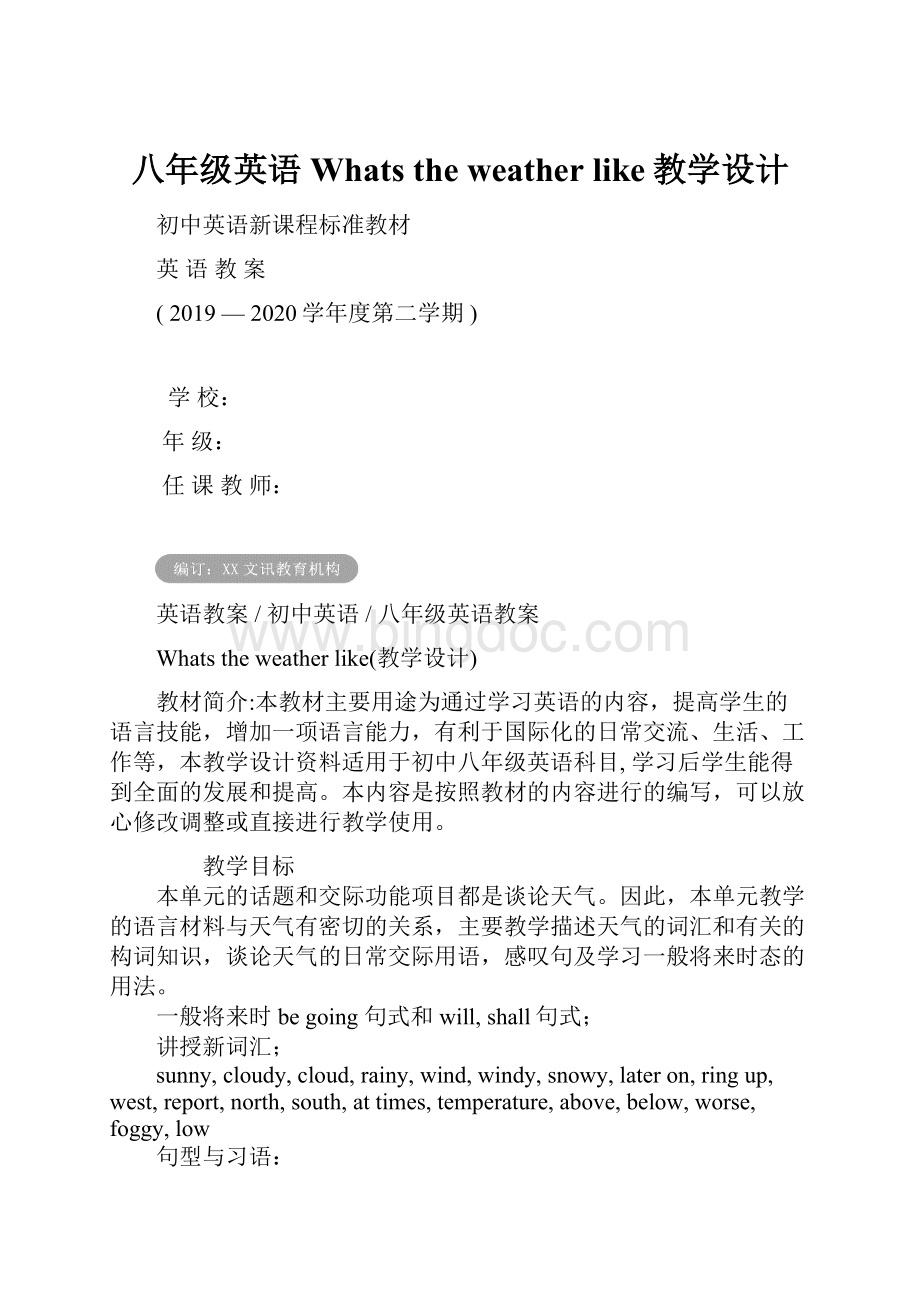八年级英语Whats the weather like教学设计.docx
《八年级英语Whats the weather like教学设计.docx》由会员分享,可在线阅读,更多相关《八年级英语Whats the weather like教学设计.docx(19页珍藏版)》请在冰点文库上搜索。

八年级英语Whatstheweatherlike教学设计
初中英语新课程标准教材
英语教案
(2019—2020学年度第二学期)
学校:
年级:
任课教师:
英语教案/初中英语/八年级英语教案
Whatstheweatherlike(教学设计)
教材简介:
本教材主要用途为通过学习英语的内容,提高学生的语言技能,增加一项语言能力,有利于国际化的日常交流、生活、工作等,本教学设计资料适用于初中八年级英语科目,学习后学生能得到全面的发展和提高。
本内容是按照教材的内容进行的编写,可以放心修改调整或直接进行教学使用。
教学目标
本单元的话题和交际功能项目都是谈论天气。
因此,本单元教学的语言材料与天气有密切的关系,主要教学描述天气的词汇和有关的构词知识,谈论天气的日常交际用语,感叹句及学习一般将来时态的用法。
一般将来时begoing句式和will,shall句式;
讲授新词汇;
sunny,cloudy,cloud,rainy,wind,windy,snowy,lateron,ringup,west,report,north,south,attimes,temperature,above,below,worse,foggy,low
句型与习语:
1.-What’stheweatherliketoday?
-It’ssunny.
2.-Whatwastheweatherlikeyesterday?
-Itwascloudy.
3.Howcolditistoday!
4.Willyouplease+动词原形
5.It’sbettertodosth.
教学建议
教学内容分析
本单元的话题“天气预报”(Weatherreport),交际功能项目是“谈论天气”(Talkingabouttheweather),它们紧密联系。
重点语言结构选用了will和shall表示的动词一般将来时,因为这种时态常用于天气预报。
同时复习了begoingto等句型。
本单元还集中学习了表示方向的单词,如north,northeast等。
本单元四课的听、说、读、写活动无一不是围绕中心话题“天气”的。
Lesson45由日期开始谈到天气,用一组插图引出描写天气的形容词,并发出感叹,介绍了Howcolditis!
Whatacoldday!
还用It’sgoingtobe/get…说明天气的变化,很自然地复习了形容词的比较等级形式。
Lesson46的对话和天气预报进一步巩固复习了有关天气的日常交际用语和语法句型。
Lesson48主要复习及有关字母和字母组合的拼读规则,学习[tr]、[dr]、[ts]、[dz]四个辅音音标及有关的字母和字母组合的拼读规则。
语法分析:
一般将来时的用法
一般将来时指在将来的时间发生的动作或状态,通常有以下几种表达法:
1.用“will/shall+动词原形”表示对未来的“预见”,如果句子的主语是人,也可能表达一种“意图”。
(1)You’llfeelbetterifyoutakethismedicine.如果你吃这种药,你会感觉更好。
(2)Johnwillmeetyouattheairport.约翰将在机场会见你。
2.用“begoingto+动词原形”表示将来打算做的事情或者根据现存的各种因素,推断很快将发生的事情。
(l)Whatareyougoingtodotomorrow?
明天你打算做什么?
(2)It'sgoingtobesunnytomorrow.明天可能是晴天(根据所观察的)。
3.“be+v.–ing”表示按计划安排的,在最近即将发生的动作。
可用于此种用法的动词有:
come,go,die,leave,arrive,begin等。
Thebusiscoming.公共汽车就要来了。
4.可用一般现在时表示将来时间,即表示按规定或时间表预计要发生的动作或事态。
可用于此种用法的动词有start,leave,come,go等。
(1)ThefootballmatchtakesplaceonFriday.星期五有一场足球赛。
(2)ThetermstartsatthebeginningofOctober.这学期将于十月初开学。
日常交际用语分析:
谈论天气
(一)英国人特别喜欢谈论天气,几乎成了见面的必说之言。
以下是一些常用语。
1.一般性谈论天气:
Lovelyday,isn'tit?
好天气,不是吗?
2.谈论气温:
It'scoldtoday,isn'tit?
今天冷,不是吗?
It'sverycold,butquitesunny.今天天很冷,但很晴朗。
3.谈风:
(1)It'sratherwindytoday,isn'tit?
今天风相当大,不是吗?
(2)It'sblowingstrongly.今天风刮得很大。
4.谈将来的天气:
(1)Itlookslikerain,don'tyouthinkso?
天看上去像是要下雨,你不这么认为吗?
(2)It'squitewindy,andthere'salotofsnow.风很大,会有雪的。
5.谈不正常的天气:
(1)It'smuchtoocold/hot.太冷(热)了。
(2)It'shotforthistimeofyear,don'tyouthinkso?
对于每年的这个时候来说太热了,你不这么认为吗?
(二)天气状况的常用语:
1.Whatbad/goodweather!
多糟(好)的天气!
2.Theradiosaysthesunwillcomeoutlater.广播说过会儿太阳将出来。
3.MostofNorthandSouthChinawillhaveacoldwetday.华北、华南大部将是冷湿天气。
4.Itwillbecloudy/rainyattimes.有时天气将多云(有雨)。
5.Thetemperaturewillstayabovezerointheday-time,butatnightitwillfallbelowzeroagain.白天气温在零度以上,夜间又降到零度以下。
6.Beijingwillbesunny.北京晴。
7.What'sthetemperaturetoday?
今天的气温是多少?
教学目标
本单元的话题和交际功能项目都是谈论天气。
因此,本单元教学的语言材料与天气有密切的关系,主要教学描述天气的词汇和有关的构词知识,谈论天气的日常交际用语,感叹句及学习一般将来时态的用法。
一般将来时begoing句式和will,shall句式;
讲授新词汇;
sunny,cloudy,cloud,rainy,wind,windy,snowy,lateron,ringup,west,report,north,south,attimes,temperature,above,below,worse,foggy,low
句型与习语:
1.-What’stheweatherliketoday?
-It’ssunny.
2.-Whatwastheweatherlikeyesterday?
-Itwascloudy.
3.Howcolditistoday!
4.Willyouplease+动词原形
5.It’sbettertodosth.
教学建议
教学内容分析
本单元的话题“天气预报”(Weatherreport),交际功能项目是“谈论天气”(Talkingabouttheweather),它们紧密联系。
重点语言结构选用了will和shall表示的动词一般将来时,因为这种时态常用于天气预报。
同时复习了begoingto等句型。
本单元还集中学习了表示方向的单词,如north,northeast等。
本单元四课的听、说、读、写活动无一不是围绕中心话题“天气”的。
Lesson45由日期开始谈到天气,用一组插图引出描写天气的形容词,并发出感叹,介绍了Howcolditis!
Whatacoldday!
还用It’sgoingtobe/get…说明天气的变化,很自然地复习了形容词的比较等级形式。
Lesson46的对话和天气预报进一步巩固复习了有关天气的日常交际用语和语法句型。
Lesson48主要复习及有关字母和字母组合的拼读规则,学习[tr]、[dr]、[ts]、[dz]四个辅音音标及有关的字母和字母组合的拼读规则。
语法分析:
一般将来时的用法
一般将来时指在将来的时间发生的动作或状态,通常有以下几种表达法:
1.用“will/shall+动词原形”表示对未来的“预见”,如果句子的主语是人,也可能表达一种“意图”。
(1)You’llfeelbetterifyoutakethismedicine.如果你吃这种药,你会感觉更好。
(2)Johnwillmeetyouattheairport.约翰将在机场会见你。
2.用“begoingto+动词原形”表示将来打算做的事情或者根据现存的各种因素,推断很快将发生的事情。
(l)Whatareyougoingtodotomorrow?
明天你打算做什么?
(2)It'sgoingtobesunnytomorrow.明天可能是晴天(根据所观察的)。
3.“be+v.–ing”表示按计划安排的,在最近即将发生的动作。
可用于此种用法的动词有:
come,go,die,leave,arrive,begin等。
Thebusiscoming.公共汽车就要来了。
4.可用一般现在时表示将来时间,即表示按规定或时间表预计要发生的动作或事态。
可用于此种用法的动词有start,leave,come,go等。
(1)ThefootballmatchtakesplaceonFriday.星期五有一场足球赛。
(2)ThetermstartsatthebeginningofOctober.这学期将于十月初开学。
日常交际用语分析:
谈论天气
(一)英国人特别喜欢谈论天气,几乎成了见面的必说之言。
以下是一些常用语。
1.一般性谈论天气:
Lovelyday,isn'tit?
好天气,不是吗?
2.谈论气温:
It'scoldtoday,isn'tit?
今天冷,不是吗?
It'sverycold,butquitesunny.今天天很冷,但很晴朗。
3.谈风:
(1)It'sratherwindytoday,isn'tit?
今天风相当大,不是吗?
(2)It'sblowingstrongly.今天风刮得很大。
4.谈将来的天气:
(1)Itlookslikerain,don'tyouthinkso?
天看上去像是要下雨,你不这么认为吗?
(2)It'squitewindy,andthere'salotofsnow.风很大,会有雪的。
5.谈不正常的天气:
(1)It'smuchtoocold/hot.太冷(热)了。
(2)It'shotforthistimeofyear,don'tyouthinkso?
对于每年的这个时候来说太热了,你不这么认为吗?
(二)天气状况的常用语:
1.Whatbad/goodweather!
多糟(好)的天气!
2.Theradiosaysthesunwillcomeoutlater.广播说过会儿太阳将出来。
3.MostofNorthandSouthChinawillhaveacoldwetday.华北、华南大部将是冷湿天气。
4.Itwillbecloudy/rainyattimes.有时天气将多云(有雨)。
5.Thetemperaturewillstayabovezerointheday-time,butatnightitwillfallbelowzeroagain.白天气温在零度以上,夜间又降到零度以下。
6.Beijingwillbesunny.北京晴。
7.What'sthetemperaturetoday?
今天的气温是多少?
Lesson45教学设计方案
Ⅰ.TeachingObjectives
1.Learningnewwordsabouttheweatherandtalkabouttheweather.
2.Learntouseexclamatorysentences.
3.Teachinganewtensethesimplefuturetense.
Ⅱ.Properties
Recorder,OverheadProjector,Computer
Ⅲ.LanguageFOCUS:
Thesimplefuturetenseandexclamatorysentences.
Ⅳ.TeachingProcedures
Leading-in
1.教师身披一件厚外套,进班和学生打招呼时做出很冷的样子说:
Howcolditistoday!
Butit’swarminclass.SoIwillputoffmycoat.
然后把外套脱掉
2.把cold,warm两词写在黑板上,问学生:
Didyoulistentotheweatherforecastyesterday?
然后放一段当天的天气预报的英语录音,将录音中出现的形容天气的词写在黑板上并解释。
cloudysunnyrainywetwindysnowy
Presentation
1.通过一段全国各地天气预报的动画图中各种天气的图标,解释其他天气的英文说法。
引导听录音,听前提问:
--What’stheweatherlikeinHarbintoday?
放一段Harbin的天气报告录音,请单个同学回答。
之后再听一遍,集体重复问答。
再逐个听广州,兰州,上海的天气报告录音。
比较各处天气,引出形容词的比较级。
colder,warmer,drier,hotter,wetter
2.不放录音,请学生根据图标自己复述,教师在必要时给与帮助。
Practice
Askthestudentstomakesentencesabouttheweather.Thenletthemdosomeexercises.
A:
What’stheweatherlike?
B:
1.It’swetandwindy.
2.Itsrainyandwindy.
3.It’ssunnyandhot.
4.Itsverysnowy,butquitewarm.
5.Itsveryrainy,butquitehot.
6.Itsverydry,butquitecold.
Presentation
1.放一段明天全国各地天气预报的动画,引导学生注意其中的时态:
一般将来时的构成。
比较其与一般现在时的不同。
2.引导学生分析感叹句的构成。
Rememberthestructures:
1.How+adj.+subject+verb!
2.What+adj.+noun(singularorplural)+subject+verb!
e.g.Howcolditistoday!
Whatacoldday(itistoday)!
Practice
1.Lookatthechartbelowandaskthestudentstomakesentencesusingthesimplefuturetense.
Notes:
1)Mark“√”referstoaffirmativesentences.
Mark“×”referstonegativesentences.
Mark“?
”referstogeneralquestionsandmakeanswerstoallthesequestions.
2)Addafuturetimetotheendofeachsentenceifnecessary,eg.tomorrow,thedayaftertomorrow,tomorrowmorning/afternoon/evening,nextSunday/year/month,lateron,soon,…
2.Letthestudentsdosometranslations.
1.她是一位多么善良的女孩呀!
2.这是一部多么有趣的电影呀!
3.他们是多么有耐心的医生呀!
4.这些书是多么新呀!
5.今天天气是多么好呀!
Keys:
1.Howkindthegirlis!
=Whatakindgirlsheis!
2.Howinterestingthefilmis!
=Whataninterestingfilmis!
3.Howpatientthedoctorsare!
=Whatpatientdoctorstheyare!
4.Hownewthesebooksare!
=Whatnewbookstheyare!
5.Howfineitistoday!
=Whatafineday(itistoday)!
3.DialoguePractice
T:
LookatExerciseTwo.Listentothetapeandrepeatafterit.
Nowletthestudentsusethepatternstopractisemore.
Atlast,trytoaskthemtomakesomenewsentences.Forexample:
1.A:
Howdryitistoday!
B:
Yes,butit’llbewetterlateron.
2.A:
Whatadryday!
B:
Yes,andit’llgetdrier,I’mafraid.
Exercisesinclass
Fillintheblanks
A.Exclamatorysentencespractice.
1.____nicetiestheyare!
2.____lovelyweatheritis!
3.____funnythejokeis!
4.____agoodideathisis!
5.____cleveryouare!
6.____terriblethatis!
7.____handsomeactorstheyare!
8.____wonderfulitis!
B.Thesimplefuturetensepractice.
1.I____themuseumtomorrow,(notvisit)
2.It____soon.(rain)
3.____I____forJuliaattheschoolgatetomorrowmorning?
(wait)Yes,you____.
4.They____careofthechildrennextSunday,(take)
5.____you____touniversitynextyear?
(go)
No,I____.BecauseImnotoldenough.
6.Peter____usthetruththisevening,(nottell)
Keys:
A:
l.What2.What3.How4.What5.How6.How7.what8.How
B:
1.won’tvisit2.willrain3.Shall/wait/will4.willtake5.Will/go/won’t6.won’ttell
Homework
1.Remembertheadjectivesofweatherandmakeadialogue.
2.Makethreeexclamatorysentencesandanotherthreesentencesusingthesimplefuturetense.
Thedesignoftheblackboard
Lesson46教学设计方案TeachingObjectives:
Learnhowtotelephonesb.andhowtousethesimplefuturetense.Properties:
Recorder,Overhead,Projector,Video
LanguageFOCUS:
thesimplefuturetense.
TeachingProcedures:
I.Organizingtheclass
Teacher:
Whatwillyoutellustoday,stu